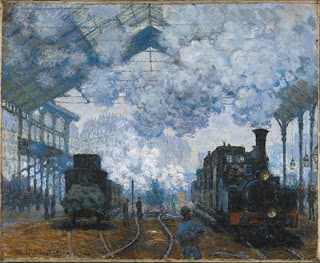CERN—the folks who gave us the World Wide Web—put the first-ever website
back up on the Web on April 30.
The website, which dates back to 1992 (the earliest that CERN could find), contains nothing but text and links. It's quite sparse by today's standards. But
it changed everything, and in such a short time. Who can imagine the world
without the Web today?
(Although CERN launched the first website in 1991, it was on April 30, 1993
when it the WWW technology was made available on a royalty-free basis.)
Thinking about all the changes wrought by the Web, I was reminded that this is
not the first time the world changed so dramatically, and in such a short time.
I am thinking, of course, about the coming of the railway—another technology
that changed everything.
That's the point made by academic, historian, essayist, philosopher and train-lover
Tony Judt, who died in August, 2010.
In an essay in the New York Review of Books titled "The Glory of
the Rails," he noted that "no competing form of transport, no subsequent
technological innovation, no other industry has wrought or facilitated change on
the scale that has been brought about by the invention and adoption of the
railway."
 |
| Claude Monet: Gare Saint-Lazare: Arrival of a Train, 1877. |
Before the arrival of railways, he wrote, travel between places like Paris to Rome had not changed for 2,000 years.
"Think of the limits placed on economic activity and human life chances by the impossibility of moving food, goods, and people in large numbers or at any speed in excess of ten miles per hour," he wrote, along with the "enduringly local nature of all knowledge, whether cultural, social, or political, and the consequences of such compartmentalization."
Until 1830, he said, "few people knew what unfamiliar landscapes, distant towns, or foreign lands looked like because they had no opportunity or reason to visit them."
After the arrival of the railway, their world
changed—for the very first time, many people could go places they had never been to before.
Trains, he said, represented a new and novel conquest of space.
"Canals and roads might be considerable technical achievements; but they had almost always been the extension, through physical effort or technical improvement, of an ancient or naturally occurring resource: a river, a valley, a path, or a pass," he wrote.
Railways, on the other hand, "reinvented the landscape. They cut through hills, they burrowed under roads and canals, they were carried across valleys, towns, estuaries."
 |
| The Opening of the Stockton & Darlington Railway, 1825, Terence Cuneo, 1949. |
This conquest of space also led to the reorganization of time.
"Even the modest speeds of early trains—between twenty and thirty-five
miles per hour—were beyond the wildest imaginings of all but a handful of
engineers," Judt said.
Trains were also dangerous.
"Signaling, communication, and braking
systems were always one step behind the steady increase in power and speed of
the engines: until well into the later 20th century trains were better at
moving than stopping," he added.
The need to keep trains from colliding—keeping them a safe distance from each other and off the same track—resulted in the creation of the timetable.
"It is hard today to convey the significance and implications of the timetable," Judt noted.
It was firstly a way to organize railway traffic, but it ended up
organizing daily life.
People needed to know the time so they would know when
the train arrived or left, and soon "everything that came after—the
establishment of nationally and internationally agreed time zones; factory time
clocks; the ubiquity of the wristwatch; time schedules for buses, ferries, and
planes, for radio and television programs; school timetables; and much
else—merely followed suit."
 |
| French Station, Guy Pène Du Bois |
Train travel also revolutionized society.
Until the opening of the
first railways in England, "people did not travel together in large groups,"
Judt said. "A typical stagecoach held four inside and ten outside. But it was
not much used, and certainly not by those with any choice.
"The wealthy and the
adventurous traveled alone or en famille—on horseback, in a post chaise or a
private carriage—and no one else traveled far or often.
"But rail travel was mass transit from the very outset—even the earliest trains conveyed hundreds of people."
There's much more in his essay which, unfortunately, is no longer available free online. But as we mark the 20th anniversary of the Web, we can celebrate that incredible innovation and also celebrate the railway—another world changing technology.

No comments:
Post a Comment